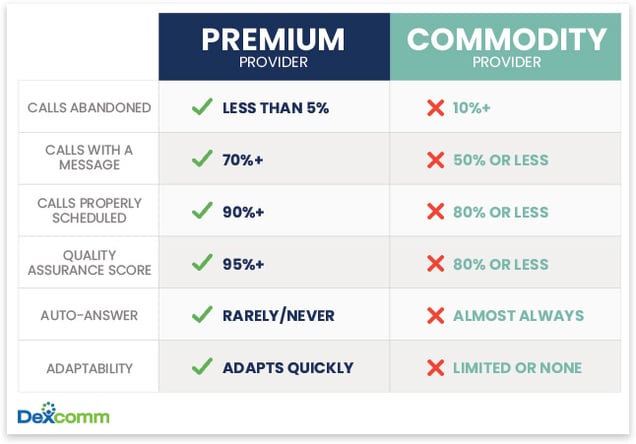
In the communications industry, telephone answering services (TAS) are typically provided by two groups: premium providers, which charge a bit more and focus on quality service, and commodity service providers, which generally compete on price.
There are six key elements for business owners to consider when deciding between a premium, quality answering service provider versus a cheap answering service. Each of these elements has an impact on your company's bottom line, your staff, and your overall efficiency.
Top six metrics that separate commodity and premium service providers:
1. Percentage of Calls Abandoned 2. Percentage of Calls with a Message |

1. Abandoned-Calls Rate
What is an abandoned call? Dexcomm defines abandon rates as the percentage of inbound calls in which a caller hangs up before connecting with an operator. For example, if you receive 1,000 calls and 50 are abandoned, your abandon rate is 5 percent.
We track abandons for calls that ring at least three times, considering that if a caller hangs up after only two rings, the reason for the abandonment is not due to slow performance on our part.
Unfortunately, many cheap answering services don’t even measure their abandonment rate. Keep in mind that because there are different ways to define and calculate abandons, comparing these rates between providers can be difficult. However, most premium answering service providers will work hard to keep abandonments at least below 5 percent, often below 3 percent.
|
How it impacts your bottom line: A high abandoned-call rate means that you are missing opportunities and not giving the quality service your customers expect, which leads to lost revenue for your business. |
2. Number of Calls with a Message
This is another number that is not as easy to calculate as it may seem, yet it is a vital number to calculate. Most companies that do measure this number will do so globally rather than for individual customers. Cheap answering service providers may seem to be capturing messages at a high rate on average, but they're still missing important messages.
|
How it impacts your bottom line: Simply put, capturing more calls means more jobs and revenue for your business, which is why you have an answering service in the first place. |
Capturing a message from a caller is a skill learned through focused training and practice. Many services do not spend the time, effort, and money to properly train their operators in the practices of successful message taking. Premium providers will generally take at least 20-30 percent more messages than commodity providers.
One of the key reasons that time-based billing makes the most sense over per-call billing is that it changes the mindset of the answering service working on your behalf. A per-call or unit billing service is generally focused on rapid call handling. Time-based billing leads to thorough message taking, encouraging your answering service to work hard to capture a message that includes all of the needed information from the caller.
3. Number of Jobs Scheduled
Calculating job scheduling can be a challenge, especially for companies that have multiple lines of business, such as HVAC, electrical, and plumbing services. Incorrectly scheduled jobs can happen for many reasons.
|
How it impacts your bottom line: Maintaining success in job scheduling involves dedicated training, coaching, and process improvement. The result to your bottom line? One in three customers will pay more to receive a higher level of service (Genesys). |
Different departments can work on installation versus repairs. Complex schedules or multiple departments being handled through one phone number can also lead to frequent errors. The act of tracking scheduling errors is a quality assurance responsibility for many quality answering services, but not all. Agents and supervisors should be listening to and following up on call quality.
Working to eliminate errors, or at least keep them to a bare minimum, is difficult and time-consuming. Success rates can be tracked only once standards for quality are established.
4. Quality Assurance Scores
Quality assurance is an essential part of every telephone answering service. Premium services also set and measure customer expectations. Gathering feedback through customer satisfaction surveys, Net Promoter Scores, and follow-up processes ensure that value is being added, which drives customer loyalty. Taking feedback to heart matters, and it’s an indicator of a premium answering service.
|
How it impacts your bottom line: If your answering service is not measuring quality, then you are not taking care of your customers. Customers that don't feel appreciated, understood, and cared for will quickly take their business to your competition. |
The call answering service industry has various Award of Excellence programs in which “mystery shoppers” place calls and grade operators on up to 31 different aspects of the call, including ring time and hold time (the issues that are complained about more than any other in our industry).
| Only 1% of customers feel their customer service expectations are always met. (Source) |
Commodity services rarely participate in industry programs and usually do not have an internal QA system. Premium services routinely compete in the industry programs and regularly win the awards, which are given to services that average over 80 percent on the 31 graded aspects of the call.
5. Auto-Answering System
An auto-answer system is set up to automatically answer the phone after a predetermined number of rings. The caller is then greeted by an automated voice or prerecorded message.
|
How it impacts your bottom line: Although auto-answer is better than voicemail, many callers are impatient and will hang up on a recording, costing you their business. |
Although auto-answering was touched on in the elements above, it is important enough to warrant its own grading line. Remember abandon rates? How many rings would you wait until you hang up and call a competitor? Callers in need of service want to speak to someone right away so that they know their problem is in the process of being taken care of.
Relying heavily on auto-answer instead of a live answer from an operator can be a tactic to lower staffing costs for a cheap answering service. Premium answering services will work with you to understand your needs and recommend auto-answer only when it best suits your needs.
6. Adaptability
Adaptability is an element that does not have a clear metric but should be a high priority when you’re choosing a provider. Adaptability means knowing that your answering service is able to make quick changes when your business has emergency issues such as weather, staffing, or equipment changes.
|
How it impacts your bottom line: Adaptability allows your partner to provide high-quality service to you and your customers even during unanticipated circumstances. Your customers expect you to be there when they need you, which means your answering service needs to be there, too. |
At Dexcomm, we frequently receive requests from customers to cancel a scheduled job because they have a service tech out, or because of weather issues that are affecting their ability to service their customers.
These issues include hurricanes forcing closures, heat waves and cold snaps causing lengthy delays, and other unanticipated issues. There is usually a large difference between premium and commodity services in the way that they handle changes on accounts.
Conclusion
Although cheap call answering services may come at a lower up-front price, a lack of quality service will eventually cause your business to lose more revenue versus premium providers, who are skilled in proper scheduling, adaptability, and gaining customers, allowing your business to grow.
For your partnership with a call answering service to be as beneficial as possible, you need to hire a company that proves its dedication to your business and customers. Low abandonment rates, high quality assurance scores, and a strong ability to adapt will be indispensable assets to your company's customer communication.
Ready to Save on Your Expenses?See how LaFond-Ardoin Funeral Homes saved 20% on their service cost using Dexcomm's solutions. |





